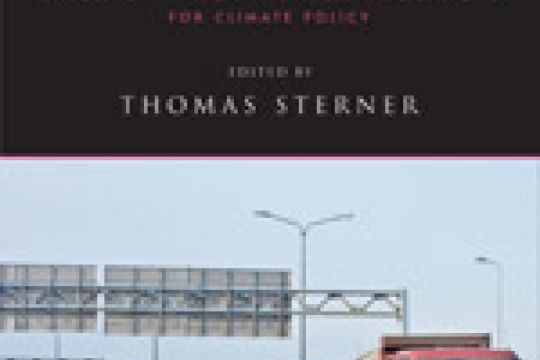Fuel Taxes and the Poor challenges the conventional wisdom that gasoline taxation, an important and much-debated instrument of climate policy, has a disproportionately detrimental effect on poor people.
Fuel Taxes and the Poor, The Distributional Effects of Gasoline Taxation and Their Implications for Climate Policy. Edited By Thomas Sterner. Published by RFF Press with Environment for Development initiative.
http://www.routledge.com/books/details/9781617260926/
Fuel Taxes and the Poor challenges the conventional wisdom that gasoline taxation, an important and much-debated instrument of climate policy, has a disproportionately detrimental effect on poor people. Increased fuel taxes carry the potential to mitigate carbon emissions, reduce congestion, and improve local urban environment. As such, higher gasoline taxes could prove to be a fundamental part of any climate action plan. However, they have been resisted by powerful lobbies that have persuaded people that increased fuel taxation would be regressive. Reporting on examples of over two dozen countries, this book sets out to empirically investigate this claim.
The authors conclude that while there may be some slight regressivity in some high-income countries, as a general rule, fuel taxation is a progressive policy particularly in low income countries. Rich countries can correct for regressivity by cutting back on other taxes that adversely affect poor people, or by spending more money on services for the poor. Meanwhile, in low-income countries, poor people spend a very small share of their money on fuel for transport. Some costs from fuel taxes may be passed on to poor people through more expensive public transportation and food transport. Nevertheless, in general the authors find that gasoline taxes become more progressive as the income of the country in question decreases.
This book provides strong arguments for the proponents of environmental taxation. It has immediate policy implications at the intersection of multiple subject areas, including transportation, environmental regulation, development studies, and climate change.
Published with Environment for Development initiative.
About the Editor:
Thomas Sterner is a Professor of Environmental Economics at the University of Gothenburg in Sweden and a University Fellow of Resources for the Future, Washington DC. He has published a dozen books and more than 75 journal articles.
Contents and Contributors:
1. Introduction Thomas Sterner; Department of Economics, University of Gothenburg, Sweden and University Fellow at Resources for the Future, Washington, DC
2. The Consumer Burden of a Carbon Tax on Gasoline Kevin A. Hassett and Aparna Mathur, American Enterprise Institute, USA Gilbert E. Metcalf, Department of Economics, Tufts University and National Bureau of Economic Research, USA
3. Distributional and Efficiency Impacts of Increased U.S. Gasoline Taxes Antonio M. Bento, Department of Applied Economics and Management, Cornell University, USA Lawrence H. Goulder, Department of Economics, Stanford University, USA Mark R. Jacobsen, Department of Economics, University of California at San Diego, USA Roger H. von Haefen, Department of Agricultural and Resource Economics, North Carolina State University, USA
4. Estimates from a Consumer Demand System: Implications for the Incidence of Environmental Taxes Sarah E. West, Department of Economics, Macalester College, USA Roberton C. Williams III, Department of Economics, University of Texas at Austin, USA and National Bureau of Economic Research
5. Fuel Tax Incidence in Costa Rica: Gasoline versus Diesel Allen Blackman, Resources for the Future Washington, DC and Environment for Development Center for Central America, Turriabla, Costa Rica Rebecca Osakwe and Francisco Alpizar, Environment for Development Center for Central America, Turriabla, Costa Rica
6. The Income Distribution effects of Fuel Taxation in Mexico Thomas Sterner; Department of Economics, University of Gothenburg, Sweden and University Fellow at Resources for the Future, Washington, DC Ana Laura Lozada, Research Director, Havas Media, Mexico
7. Is Fuel Taxation Progressive or Regressive in China? Jing Cao, Department of Economics, School of Economics and Management, Tsinghua University, China
8. Are Fuel Taxes in India Regressive? Ashokankur Datta, Research Fellow, Planning Unit, Indian Statistical Institute, New Delhi, India
9. Is Reducing Subsidies on Vehicle Fuel Equitable? A Lesson from Indonesian Reform Experience Arief Anshory Yusuf, lecturer and researcher at the Faculty of Economics, Padjadjaran University, Indonesia Budy P. Resosudarmo, Associate Professor Arndt-Corden Division of Economics Crawford School of Economics and Government, The Australian National University Canberra, ACT 0200 Australia
10. Distributional Consequences of Transport Fuel Taxes in Ethiopia Alemu Mekonnen, Assistant Professor, School of Economics, Addis Ababa University and Research Fellow at the Environmental Economics Policy Forum for Ethiopia, Ethiopian Development Research Institute, Ethiopia. Rahel Deribe, Junior Researcher, Environmental Economics Policy Forum for Ethiopia, Ethiopian Development Research Institute, Ethiopia. Liyousew Gebremedhin, Data Manager, Environmental Economics Policy Forum for Ethiopia, Ethiopian Development Research Institute, Ethiopia.
11. Political Petrol Pricing: the Distributional Impact of Ghana's Fuel Subsidies Wisdom Akpalu, Department of History, Economics and Politics, Farmingdale State College, State University of New York, USA Elizabeth J Z Robinson, Associate Professor of Economics, School of Business, Economics, and Law, University of Gothenburg and Research Associate, Environment for Development Tanzania
12. Distributional Effects of Transport Fuel Taxes in Kenya: Case of Nairobi John M. Mutua, Kenya Institute for Public Policy Research and Analysis (KIPPRA), and Junior Research Fellow, Environment for Development, Center for Kenya Martin Börjesson, Department of Energy and Environment, Chalmers University of Technology, Sweden Thomas Sterner; Department of Economics, University of Gothenburg, Sweden and University Fellow at Resources for the Future, Washington, DC
13. Assessing the Impact of Oil Price Changes on Income Distribution in Mali: An Input-Output Approach Kangni Kpodar, International Monetary Fund, Washington, DC
14. An Analysis of the Efficacy of Fuel Taxation for Pollution Control in South Africa Margaret Chitiga, Department of Economics, University of Pretoria, South Africa. Ramos Mabugu, Head of Research and Policy, Financial and Fiscal Commission, Midrand, South Africa. Emmanuel Ziramba, Professor of Economics, University of South Africa in Pretoria, South Africa
15. Fuel Taxation and Income Distribution in Tanzania Adolf F. Mkenda and John K. Mduma, Department of Economics, University of Dar es Salaam, Tanzania Wilhelm M. Ngasamiaku, Department of Economics, University of Dar es Salaam Tanzania
16. Distributional Effects in Europe Thomas Sterner; Department of Economics, University of Gothenburg, Sweden and University Fellow at Resources for the Future, Washington, DC Emanuel Carlsson, former Research Assistant at the Department of Economics, University of Gothenburg, Sweden.
17. Who Pays Taxes on Fuels and Public Transport Services in the Czech Republic? Ex post and Ex ante Measurement Milan Šèasný, Charles University Prague, Environment Center
18. Distributional Effect of Reducing Transport Fuel Subsidies in Iran Sanaz Ettehad; Department of Economics, University of Gothenburg, Sweden Thomas Sterner; Department of Economics, University of Gothenburg, Sweden and University Fellow at Resources for the Future, Washington, DC
19. Conclusions Thomas Sterner; Department of Economics, University of Gothenburg, Sweden and University Fellow at Resources for the Future, Washington, DC Jing Cao, Department of Economics, School of Economics and Management, Tsinghua University, ChinaEmanuel Carlsson, former Research Assistant at the Department of Economics, University of Gothenburg, SwedenElizabeth Robinson, Associate Professor of Economics, School of Business, Economics, and Law, University of Gothenburg and Research Associate, Environment for Development Tanzania









